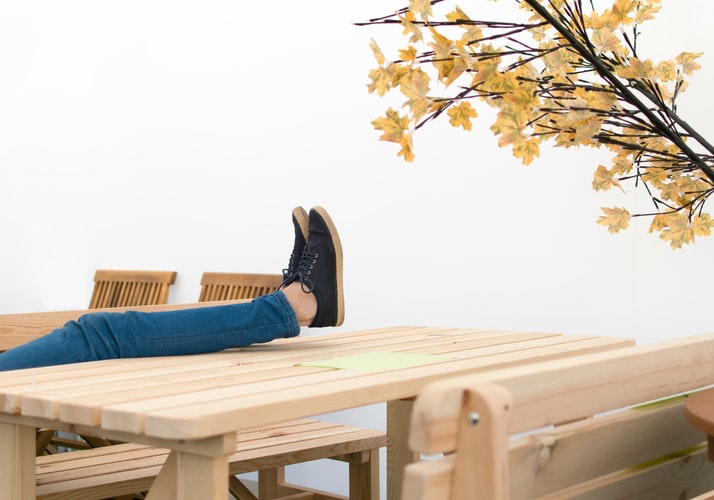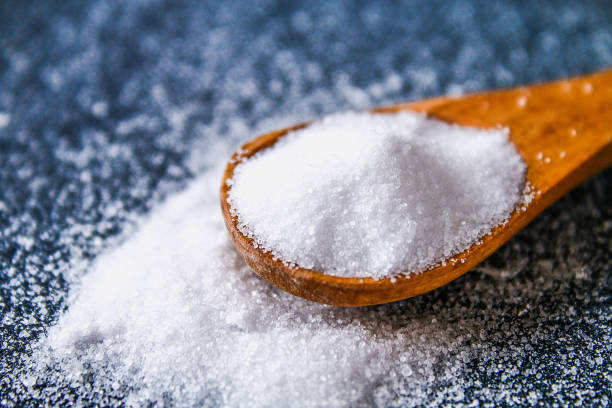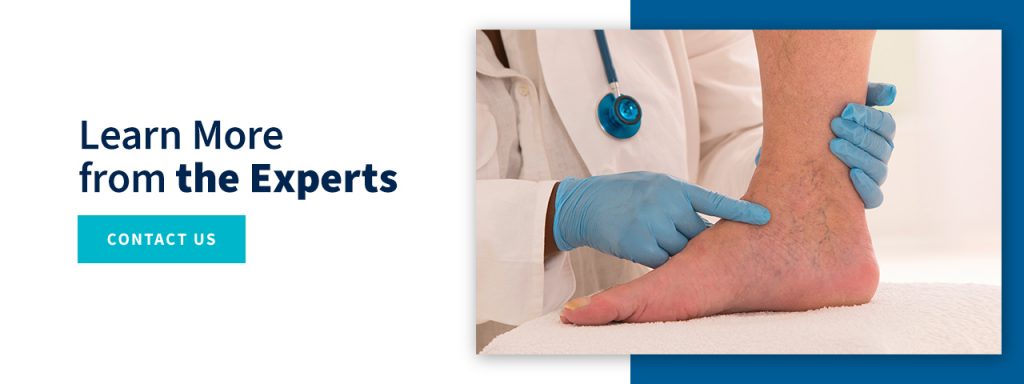
How do we keep our veins healthy? We know that proper circulation is important for our overall health. And if valves in our veins become damaged, our vein’s ability to circulate blood properly becomes compromised. This is especially true in the lower leg, where veins must work harder to push blood upward against gravity. If the veins are damaged, then blood can pool in the lower leg and create a varicose vein. As the best vascular surgeons in Orlando, our team at Central Florida Vein & Vascular Center knows that one of the best things anyone can do to keep varicose veins at bay is to make small, easy lifestyle changes that benefit your vein health.
One of the biggest complaints about varicose veins is the pain often associated with it. Varicose veins are formed when vein valves are no longer able to push blood upward through the leg, against the flow of gravity. As a result, blood pools in the vein and causes it to swell. Dark, bulging veins may be visible just under the surface of the skin. Whether or not there are visible signs, you may experience heaviness, itchiness, fatigue, or pain in your lower leg.
Many of us work jobs that require us to either sit or stand for extended periods of time. While we may hear from time to time that neither of these behaviors are great for our health, we don’t always make the adjustments needed to keep our bodies healthy at work. Hours of standing and sitting can impact your circulation and put excess pressure on the veins.
An easy way to offset the damage done by sitting or standing? Keep your legs elevated when you can. This encourages blood to flow back up the leg toward the heart instead of pooling in the vein. If you’re not able to elevate your legs at work, then try flexing and bending your legs frequently throughout the day to promote proper circulation in the leg.
Try placing your feet on a table or lie down and prop up your legs on a few pillows. You can also lie down and put your legs against a wall to elevate them. No matter which method is best for you, we recommend holding the position for at least 15 minutes.
Cold water, such as a cool swimming pool on a hot day, is great for relieving swelling — including the swelling caused by varicose veins! Opt for cold water over hot water when bathing. This can help shrink the blood vessels and minimize swelling. On the flip side, it’s also important to avoid hot water. Heat can have the opposite effect on your veins, causing them to swell even more. If you’ve noticed your veins feel worse after a hot shower, try cooler water instead.
If you are able to handle going one step further than cold water, start using ice for varicose veins. Ice is good for varicose veins for many of the same reasons as cold water.
This is easier said than done during the hot Florida summers. Still, the more you can stay cool, the happier your veins will be. Long periods spent in hot conditions, whether you’re outside tanning or inside enjoying a hot bath, can cause veins to swell and further irritate varicose veins. We recommend avoiding heat when you can. And, when it’s unavoidable, wear loose-fitting clothing and stay hydrated to give your body some extra support. A great way to escape the heat and stay cool is by swimming, which has buoyancy and vasoconstriction vein benefits.

A diet high in salt can cause you to retain water, which can put excess pressure on stressed veins. Cutting down salt can minimize water retention. Keep in mind that most of our salt doesn’t come from the salt shaker. It’s often hidden in processed foods. Read labels to ensure you’re not unknowingly maxing your salt intake. Even if a package claims its contents are low-sodium, the label may tell a different story.
Upping your potassium intake can also be an effective way to minimize water retention. Plenty of tasty foods can give you a healthy potassium boost. Try picking up almonds, lentils, potatoes, and leafy vegetables during your next grocery run to add more potassium to your diet.
Love sweet foods? Choose your favorite fruits over snacks high in processed sugar. Too much sugar in your body leads to an increased production of low-density lipoprotein which sticks to blood vessel walls. This increases your risk of developing varicose veins or blood clots. If you already have varicose veins, increased sugar levels can further irritate symptoms.
Fruits and veggies are a tasty way to cure a craving for something sweet, but remember that fresh is always best. Canned or processed foods can still be packed with added sugar and preservatives, and often don’t pose the same benefits that fresh foods do.
Flavonoids can improve circulation, leading to lower blood pressure and more relaxed blood vessels. Foods high in flavonoids include vegetables like onions, bell peppers, spinach, and broccoli. There are also plenty of tasty fruits high in flavonoids. Try picking up citrus fruits, grapes, cherries, apples, or blueberries. Central Florida Vein and Vascular sells a supplement called “Lymphatic Formula” which supports healthy lymphatic function because it contains the micronized purified flavonoid fraction (MPFF) of Diosmin and Hesperidin as well as Selenium and Vitamin D. This supplement is especially important for patients with lymphedema and lipedema.
There are specific foods that pose great benefits to your vein health. First, try adding more fiber to your diet by opting for whole wheat flour over white. This often means staying away from white bread, pasta, and rice, and instead choosing their whole wheat counterparts. Women should aim for 21 to 25 grams of fiber daily, while men should aim for 30 to 38 grams.
Next, look for foods that are rich in Rutin. These foods have been shown to reduce swelling, aching, and pain that often accompany varicose veins. Try incorporating buckwheat, blackberries, apples, apricots, and grapes into your diet. Many of them make great snacks!
Last, look for bioflavonoid-rich foods. These foods have antioxidants and anti-inflammatory qualities that can also reduce swelling in the veins and strengthen connective tissues in the vein walls. Try picking up some of the following next time you grocery shop: red bell peppers, strawberries, citrus, broccoli, mangoes, garlic, spinach, or teas. As always, opt for fresh foods over canned or processed ones, where possible.
Compression legwear gradually applies pressure to the leg, with the most pressure near the ankle. This helps minimize pain and swelling associated with varicose veins by gently circulating pooled blood back up the leg. Compression stockings come in various sizes and levels of compression, so it’s best to consult a specialist about this legwear to make sure you’re getting the size that will be most beneficial for your vein health.
Many jobs require employees to either stand or sit for long periods of time. This can be troublesome for healthy circulation and puts a lot of stress on the veins in the lower leg. Regularly taking breaks to walk or stretch during the day can promote healthy circulation. Frequent low-impact exercises like walking or swimming can also help strengthen the calves and lead to better circulation. You don’t need an extensive workout routine — fitting in a 30-minute walk or swim daily can be beneficial for your veins.
Trampolines aren’t just for kids. If it’s been years since you’ve had fun jumping around, it may be time to get back into it. This childhood favorite activity has proven beneficial for your overall health and especially good for veins! The act of jumping on a trampoline can promote circulation, which reduces the amount of blood pooling in the vein. And if you’re looking to lose weight or strengthen your knees and ankles, rebounding could be just the thing you need.
How much can you incorporate into your schedule? You don’t need to set aside a lot of time. Just spending five minutes on a trampoline, three times a day, can be beneficial for your veins. If you want to exercise but hate running, put rebounding in your exercise routine as a substitute! You can get similar benefits as running in under 20 minutes.
High-impact exercise isn’t for everyone, and this is especially true if you have bad joints. The ease and accessibility of yoga make it a perfect choice to build strength and flexibility. Many of the poses are good for your vein health, too! Some poses compress and decompress the veins, while others use gravity to promote circulation.
Don’t have time to jump into a yoga class? There are still easy poses you can do at home to help your legs. Here’s an easy one: while on the floor, lie on your back near a wall. Now, place your legs so that they’re resting up against the wall. Relax and breathe! This helps to drain the blood back up through your leg. It’s relaxing after a long day at work, especially if you’ve spent the entire day in a chair and the deep breathing, a mainstay of yoga, actually helps the venous blood flow better in your veins.
Tight clothing and certain shoes can constrict blood flow. This isn’t good for anyone but is especially problematic when you’re already experiencing pain from varicose veins. Instead, choose loose-fitting clothing and comfortable shoes. You’ll get an added bonus if your clothing options keep you cool in hot temperatures, as warm weather can also lead to unwanted leg pain.
There are specific extracts that have been shown to reduce swelling and may relieve some of the pain from varicose veins. Horse chestnut extract can reduce pain, heaviness, and itching for some individuals, while others may benefit from sea pine extract and butcher’s broom extract. Remember that, if these are used in essential oil form, they should be diluted before applying to the painful area.

At the end of the day, these steps can help you manage your varicose vein pain, but only treatment from a specialist can get rid of it. Treatment itself is minimally invasive and done in-house by a specialist, which minimizes stress on both your life and your body. After treatment, you’ll be able to enjoy legs without visible, painful varicose veins. We still recommend keeping these tips in mind even after treatment, as many of these habits can help keep your veins healthy and happy.
Looking to take the first step toward pain-free legs? Our team of the best vascular surgeons in Orlando at Central Florida Vein & Vascular Center is here to help. Our team has over 45 years of experience in vein care, and we understand that treatment isn’t one-size-fits-all. During an initial consultation, we will work with you to assess the current state of your vein health, address your questions and concerns, and create a treatment plan that will work best for you and your veins. You can schedule a consultation to see us at one of our four locations today!